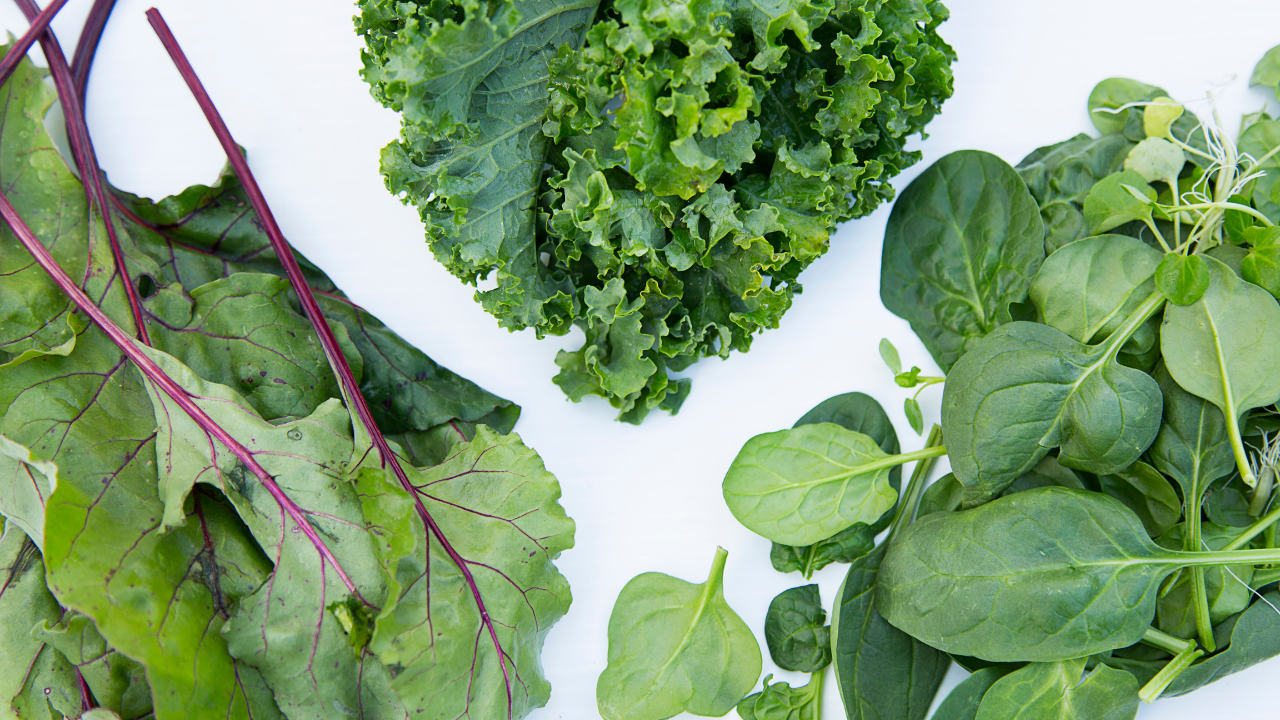Eat Dark Leafy Greens to Reduce Anxiety
Jan 15, 2021
Dark leafy greens take first place in managing, alleviating, and even preventing anxiety!
Dark leafy greens include:
• kale
• spinach
• parsley
• lettuce
• broccoli
• broccoli sprouts
• collard greens
• chard
• arugula
• bok choy
• mustard greens
• dandelion greens
One of the main reasons dark leafy greens are #1 on my list of anxiety-reducing foods is that they contain the compound chlorophyll—the pigment that makes plants green—which enhances our tolerance for oxidative stress. One particular study on the antioxidative capacity of chlorophyll isolated from spinach described how it increased the life span of microorganisms by more than 20 percent. The researchers report that “dietary chlorophyll derivatives support the recommendation of nutritionists to eat green vegetables and salads containing high contents of chlorophyll, as this could help to improve human health and prevent diseases.”1
Another reason dark leafy greens take first place is their high antioxidant level. The level of nutrients in green leafy vegetables with positive bioactive properties is off the charts, which is why countless studies show that symptoms of depression and anxiety can be reduced significantly, and positive mood and life satisfaction increased significantly when we eat more dark leafy greens.2
Dark leafy greens help to protect the brain and support its optimal functioning, preventing cognitive decline. The primary nutrients (including bioactive ones) in dark leafy greens as well as in green vegetables include vitamin K (phylloquinone), vitamin C, vitamin E (alpha-tocopherol), beta carotene, lutein, nitrate, folate, and kaempferol.
Dark leafy greens are also among the best sources of magnesium on earth. Dietary intake of magnesium has been shown to be insufficient in a staggeringly high percentage of Western populations, including 68 percent of American adults and 72 percent of middle-aged French adults. 4 The relationship between magnesium and depression and anxiety states has been well established in studies of the depletion and supplementation of magnesium in animals and humans. 5
One study included volunteers from more than 40 retirement communities, senior public housing units, and churches and senior centers in the Chicago area. The researchers came to the conclusion that consumption of approximately one serving per day of green leafy vegetables—and other foods rich in phylloquinone (vitamin K1), lutein, nitrate, folate, alpha-tocopherol (vitamin E), and kaempferol—may help to slow cognitive decline with aging. They noted that “the addition of a daily serving of green leafy vegetables to one’s diet may be a simple way to contribute to brain health.” 6
Research shows that increasing our intake of vegetables of every kind can protect against cognitive decline.7 Dark-green leafy plants, however, give us the strongest protection. A study of aging women found that those consuming the greenest leafy vegetables experienced a slower decline than women consuming the least amount.8 A healthy brain almost certainly is going to be less inclined toward mood disorders. I believe that dark leafy greens are a major contributor to my well-being today.

Ways of Incorporating Dark Leafy Greens in Your Anxiety-Free Kitchen:
- Use kale, spinach, lettuce, and collard greens as a base for your salads! A combination of all of them makes for one vibrantly green salad bowl.
- Eat them raw.
- Cook them with stir-fried vegetables.
- Add chopped dark leafy greens—especially parsley and spinach—to soups.
- Include them in smoothies and juices.
- Use liquid chlorophyll in your water, juices, smoothies, tea, and/or coffee.
Anxiety-Free Recipes with Dark Leafy Greens in my new book:
- Superfood Kale Salad
- Master Smoothie
- Super Greens Juice
- Broccoli Popcorn
Sources:
1. E. Wang and M. Wink, “Chlorophyll Enhances Oxidative Stress Tolerance in Caenorhabditis elegans and Extends Its Lifespan,” PeerJ, vol. 4 (April 7, 2016), p. e1879, doi: 10.7717/peerj.1879.
2. K.L. Brookie, G.I. Best, and T.S. Conner, “Intake of Raw Fruits and Vegetables Is Associated with Better Mental Health Than Intake of Processed Fruits and Vegetables,” Frontiers in Psychology, vol. 9 (April 10, 2018), doi: 10.3389/fpsyg.2018.00487.
3. D.E. King, et al., “Dietary Magnesium and C-Reactive Protein Levels,” Journal of the American College of Nutrition, vol. 24, no. 5 (June 2005), pp. 166–71, doi: 10.1080/07315724.2005.10719461
4. P. Galan, et al., “Dietary Magnesium Intake in a French Adult Population,” Magnesium Research, vol. 10, no. 4 (December 1997), pp. 321–8, PMID: 9513928.
5. N.B. Boyle, C. Lawton, and L. Dye, “The Effects of Magnesium Supplementation on Subjective Anxiety and Stress: A Systematic Review,” Nutrients, vol. 9, no. 5 (May 2017), doi: 10.3390/nu9050429; M.L. Derom, et al., “Magnesium and Depression: A Systematic Review,” Nutritional Neuroscience, vol. 16, no. 5 (September 2013), pp. 191–206, doi: 10.1179/1476830512Y.
6. M.C. Morris, et al., “Nutrients and Bioactives in Green Leafy Vegetables and Cognitive Decline: Prospective Study,” Neurology, vol. 90, no. 3 (January 16, 2018), pp. e214–22, doi: 10.1212/WNL.0000000000004815.
7. M.C. Morris, et al., “Associations of Vegetable and Fruit Consumption with Age-Related Cognitive Change,” Neurology, vol. 67 (October 24, 2006), pp. 1370–76, doi: 10.1212/01.wnl.0000240224.
8. J.H. Kang, A. Ascherio, and F. Grodstein, “Fruit and Vegetable Consumption and Cognitive Decline in Aging Women,” Annals of Neurology, vol. 57 (2005) pp. 713–20, doi: 10.1002/ana.20476.


